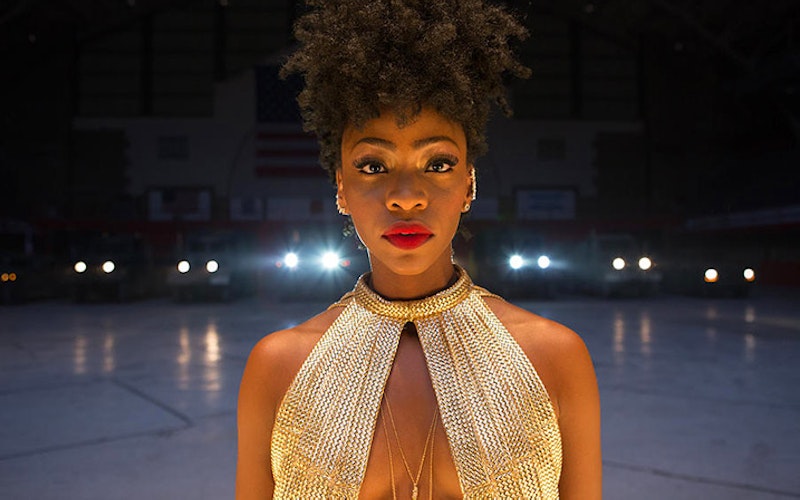
Movies
The Oscars’ Fear of a Black Planet
It’s become an unfortunate annual tradition to grouse about the lack of diversity among the nominations for the Academy Awards. In fact, the affront has become so expected that earlier this week The Nightly Show with Larry Wilmore did a bit called “A Preview of Upcoming Black Oscar Snubs.”
Sure enough, yesterday’s announced Best Picture nominees did disappoint. It’s a very white, very male, very straight list. (In the acting categories, there isn’t one person of color.) What was particularly galling about the Best Picture category was not so much the lack of diverse nominees, but the fact that Academy voters had so many opportunities this year to highlight films that represented other races, ethnicities and sexual orientations.
Consider Chi-Raq. Sure, it’s an inflammatory comedy from Spike Lee, but no more so than most of the other work from this two-time Oscar nominee. In fact, it’s his most well-received film in years (appearing on a handful of top 10 lists, including mine) and we all know how the Academy loves comeback stories. Except, for some reason, this one.
More shocking is the exclusion of Carol from the roster of Best Picture nominees. Actresses Cate Blanchett and Rooney Mara were nominated for portraying a socialite and salesgirl, respectfully, who embark on a doomed affair in 1950s New York City. Yet the film itself - an exceedingly Oscar-friendly period piece - failed to make the cut for the most prestigious category, marking another missed opportunity to shake up the male, heterosexual crowd.
Others have complained about the lack of Best Picture nods for both Creed, featuring an African-American star (Michael B. Jordan) and director (Ryan Coogler) and Straight Outta Compton, from black director F. Gary Gray. I have yet to catch up with those two films, but they’ve been praised by audiences and critics and consist of Oscar-bait material. Both seem to have offered Academy voters an easy, respectable way to bring diversity to the nominees.
Academy voters had so many opportunities this year to highlight diversity.
Why should any of this matter to Christians? For the same reason anything should: because it likely would have mattered to Jesus. He was there at the beginning of creation, after all, when diversity — “various kinds” — was one of God’s guiding principles. When God looks at the pasty-white panel of Oscar nominees, he probably wonders why those of his creatures who call themselves artists insist on painting with only one color.
What’s more, much of Jesus’ ministry involved seeking out those on the margins, whose stories were ignored, muted or otherwise swept under the rug. From the Samaritan woman to Zacchaeus to the 10 men with leprosy, Jesus regularly engaged with those whom society had cast aside, meeting them where they were and asking them to share their stories. Once a relationship had been built, he would then share his.
This is one of the miraculous things that movies can do: enable us in the audience — especially those of us who are comfortable and privileged — to hear the stories of the disenfranchised. And it’s fair to say that right now, this is an especially urgent need. Is it too much of a stretch to suggest that the disconnect between the white evangelical church and the African-American Christians in the #BlackLivesMatter movement might be because the former group hasn’t taken the time to listen to the latter’s stories? And if so, couldn’t watching a movie like Chi-Raq, which is partially about police conduct in African-American neighborhoods, be one way of doing that? There is a straight line from #BlackLivesMatter to #OscarsSoWhite.
Similarly, Carol helps moviegoers understand what it might have been like to be gay in Eisenhower’s discriminatory, 1950s America. And Tangerine, another film on my top 10 list, focuses on a pair of black transgender prostitutes working the streets of Los Angeles on Christmas Eve. Believe it or not, listening to Alexandra (Mya Taylor) and Sin-Dee (Kitana Kiki Rodriguez) bicker over their makeup isn’t all that different from listening to the Samaritan woman at the well.
When a cultural behemoth like the Academy Awards refuses to make space for these other voices, faces and experiences, we all lose. And when Academy voters snub such films even after the people behind them have played by the usual Oscar rules, it almost feels willful. A particular shame will shadow the Academy Awards ceremony this year. The choice of host now stands as a delicious irony. Your turn, Chris Rock.
Topics: Movies, Culture At Large, Arts & Leisure